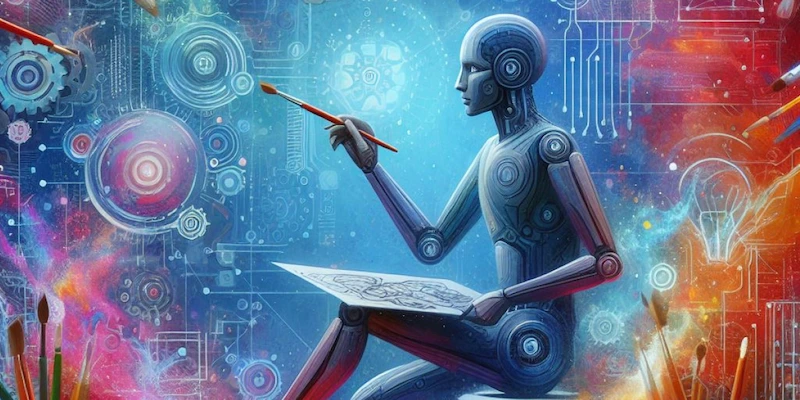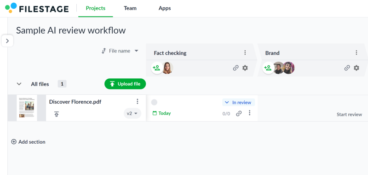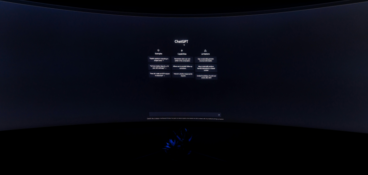Over the last year, AI has shouldered its way into the lives of marketers all over the world. And with the AI market set to hit almost $300 billion by the end of 2024, it shows no signs of slowing down.
But who’s using AI the most? And, more importantly, how do people really feel about it?
To find out, we surveyed 250+ marketing professionals from global brands like BBC and LinkedIn, plus dozens of agencies, freelancers, production companies, and startups.
Here’s what we learned.
76% use AI to create marketing content, with 42% using it daily or weekly
We’ve all dabbled with AI tools like ChatGPT over the last year. But one of the biggest surprises in our study was just how often people are using it.
We found that startups (56%), agencies (53%), and freelancers (51%) are using AI daily or weekly to create marketing content.
On the flipside, marketers at established brands use AI the least, with 35% saying they never use it.
You can see a full breakdown of how often each company type uses AI below.
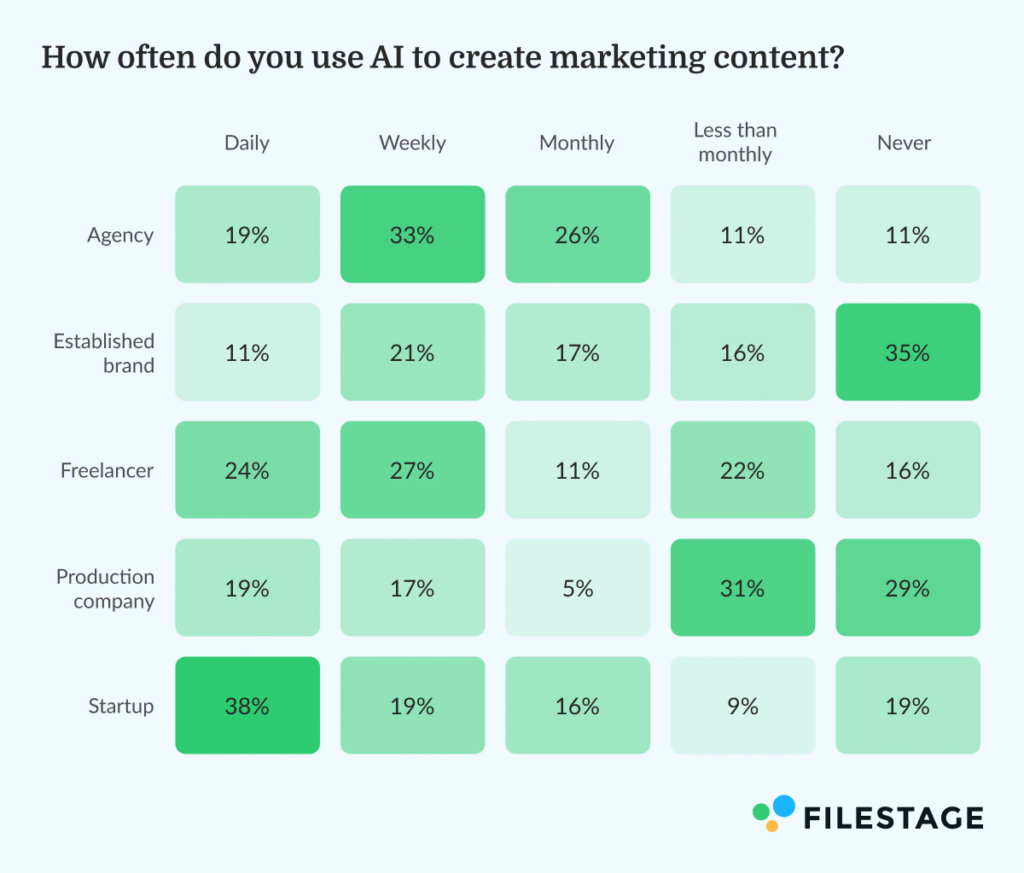
41% haven’t told their stakeholders they’re using AI, with 2-in-3 not telling their manager or clients
As AI adoption increases, companies are going to have to start making decisions about transparency and ethics.
Our findings show that 41% haven’t told their stakeholders that they’re using AI. But this varies wildly depending on the company type. 54% of people at production companies haven’t told their stakeholders, compared to just 23% at startups.
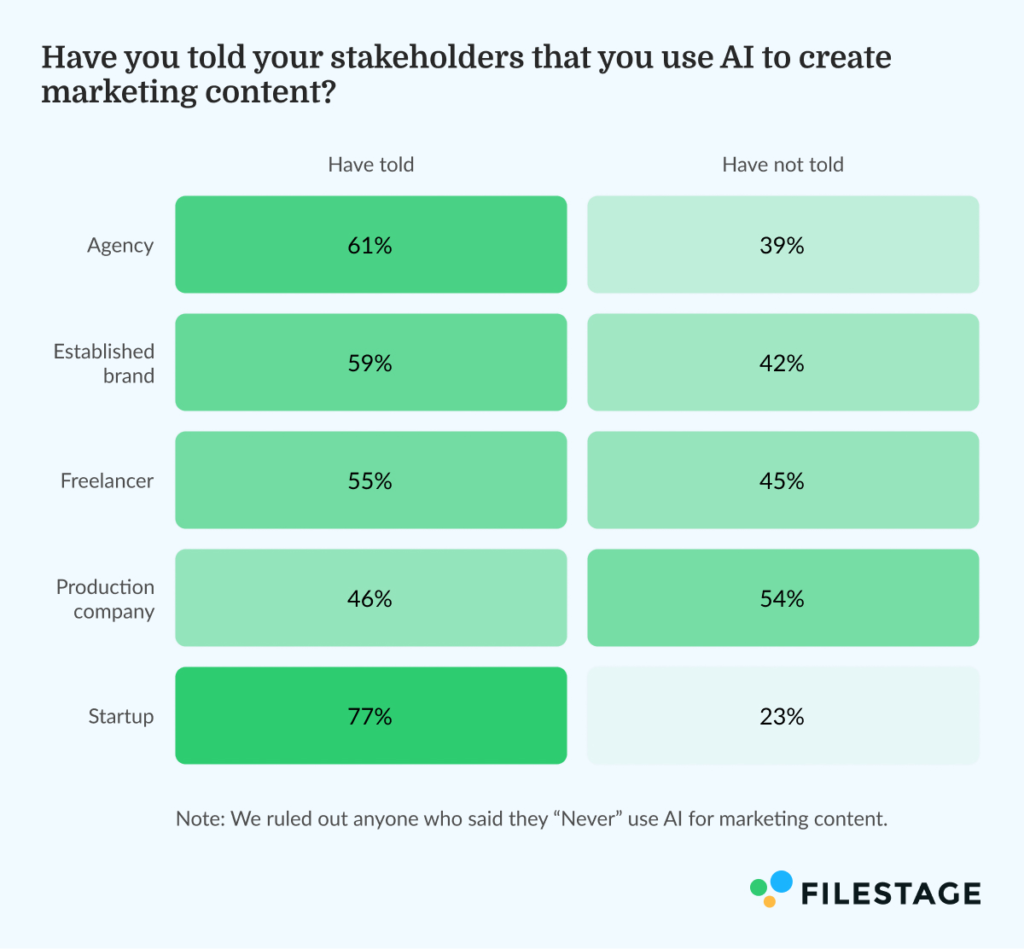
To dig into this a little deeper, we looked at which stakeholders people have told.
This revealed that 56% haven’t told their teammates they use AI to create marketing content. But the biggest surprise was that 2-in-3 haven’t told their manager or clients that they’re using AI.
Freelance digital PR consultant, Olivia Lott, helps shine a light on why this is the case. “I use AI tools in many different ways to support my work, but I’ll never rely on the output as it is, because the simple fact is, it’s not up to scratch.
“For example, I’ve tested several generative AI tools for writing press releases, and so far, not a single one has produced anything remotely close to the standards I insist on in my work. Before it goes to my clients, everything that comes out of AI will then go through me to refine and improve to the high-quality standards I pride myself on.
“Rather than it being a case of deliberately hiding my use of AI, it’s more that I treat it like any other tool I use in my work, whether it’s looking something up in Google, or analyzing a competitor in Ahrefs. What would be the point of telling my clients every time I’ve Googled something?
“If I was using AI to create imagery for a campaign, for instance, then of course I would tell my client. Ultimately, they’re interested in the final piece of work and results I achieve for them, not the minute details of every step I’ve taken to get there.”
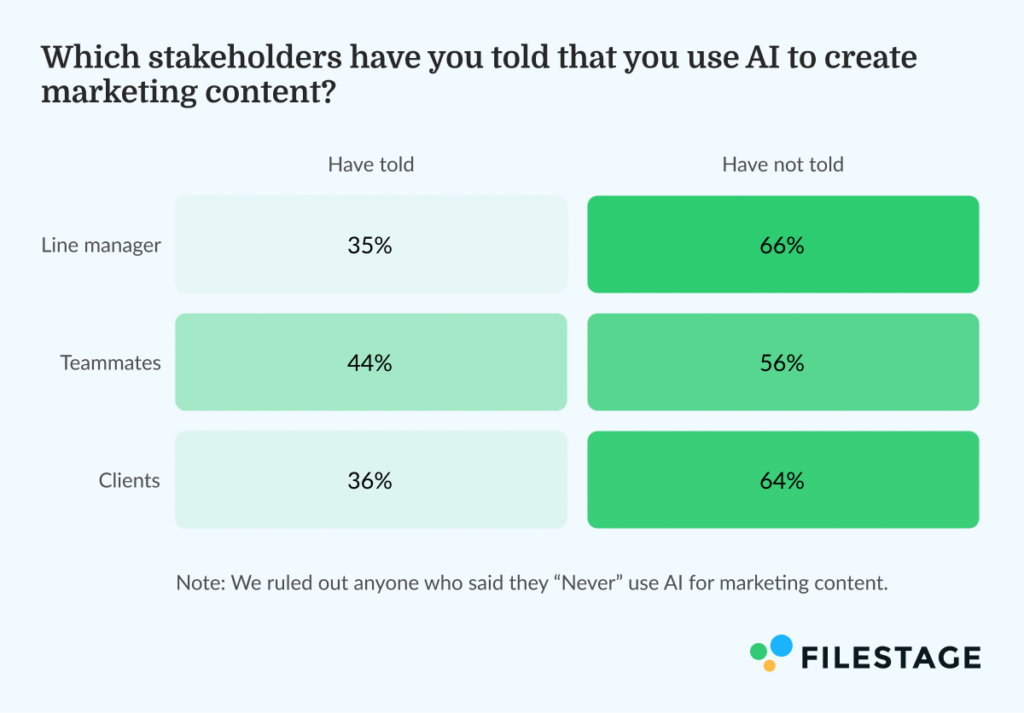
83% think AI will boost their productivity, but 1-in-3 say it will have a negative impact on self-esteem
Now we get to the meat of the topic. How do people feel about AI and the way it’s impacting their work?
Across the board, people felt AI would have a positive impact on:
- Productivity – 83%
- Profitability – 62%
- Creativity – 59%
Agencies were most positive about profitability (74%) and creativity (70%), while startups were most positive about productivity (91%).
Niklas Dorn, CEO and Co-founder at Filestage, says, “The startup mantra has long been ‘done is better than perfect’. So it’s no surprise that people at startups are feeling super-positive about AI as a productivity driver.

The startup mantra has long been ‘done is better than perfect’. So it’s no surprise that people at startups are feeling super-positive about AI as a productivity driver.
Niklas Dorn, CEO and Co-founder at Filestage
“Over the last year, it feels like we’ve all been involved in one big experiment to test and probe the possibilities of generative AI. Now, looking ahead to the next 12 months, I think it will all be about refining how we use it. We know the prompts and use cases where it’s most effective, so we’re ready to start reaping the rewards of those time savings.”
But unlike productivity, the topic of AI and creativity was a little more divisive. While one respondent said, “I think it will enhance our creativity more than ever before,” another said, “it will decimate the industry and lead to more bland, safe content.”
Ouch!
This is evidenced by the fact that creativity also popped up in the top three things people think AI will have a negative impact on:
- Self-esteem – 32%
- Recognition – 25%
- Creativity – 20%
Out of all company types, established brands (27%) were most negative about AI’s impact on creativity. And production companies were most concerned about self-esteem (45%) and recognition (36%).
“AI doesn’t only mean that the job gets quicker and easier,” says Petra Gönczi, Senior Content Marketing Specialist & Content Writer. “In some cases, depending on the person’s personality, there can be a prickling sensation that reminds them that they didn’t actually create the piece, or at least, not all of it. How can you be satisfied and proud of your work if it is not really yours?”
And then there’s the concern over how AI tools are trained. Gönczi continues, “The question of recognition comes into the picture if your work, written or visual, becomes part of the data the AI is fed on. If later your creation appears as someone else’s who used AI to help them, how will you ever be recognized for your work?”
Overall
Agencies
Brands
Freelancers
Production companies
Startups
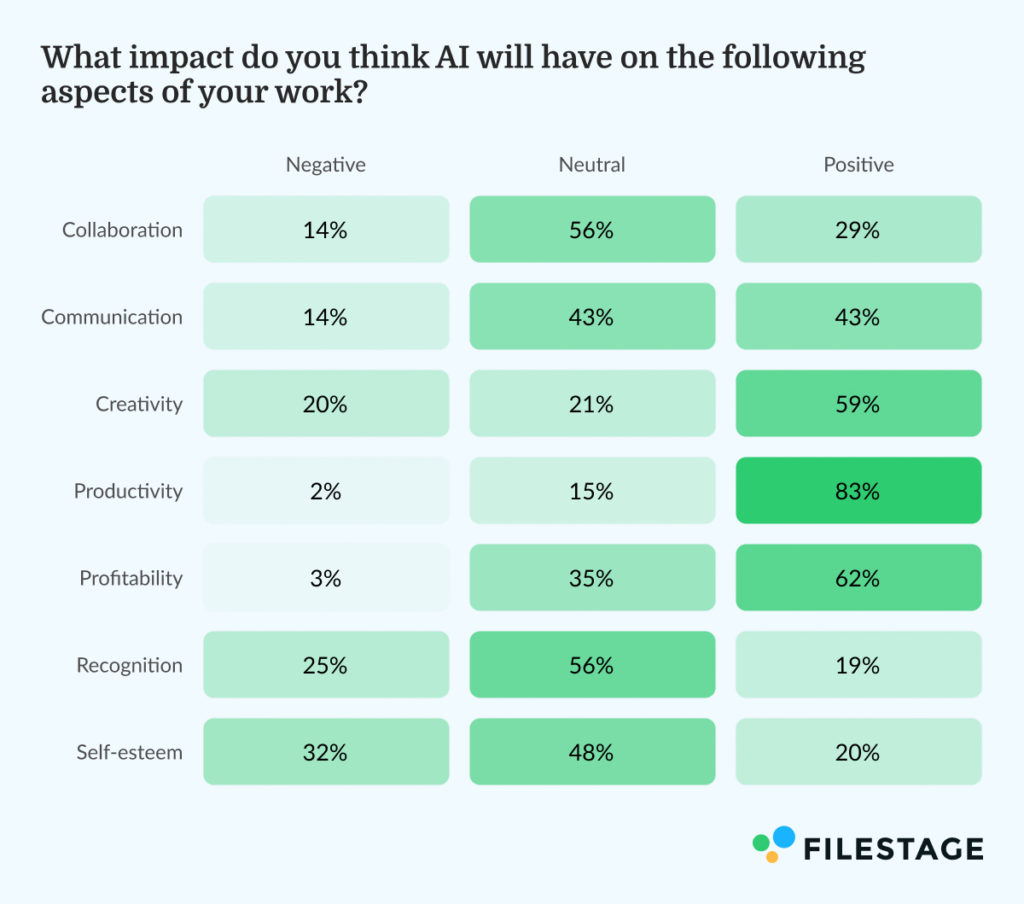
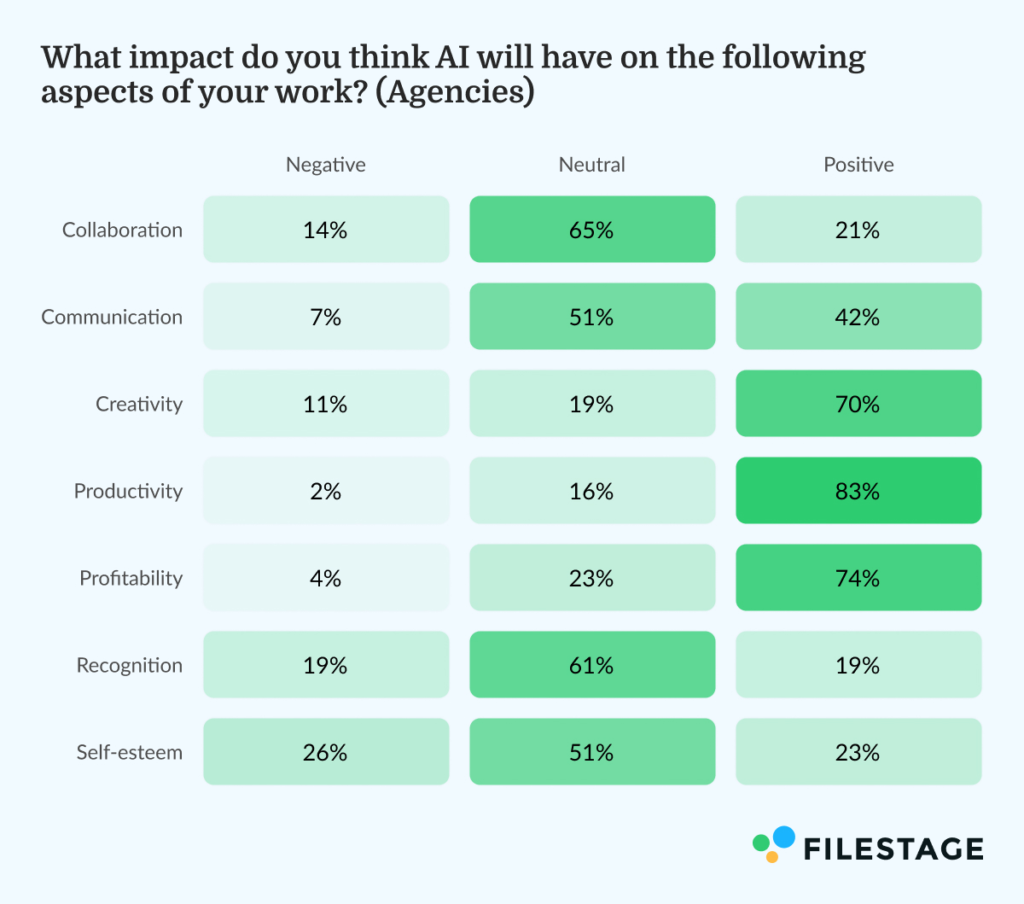
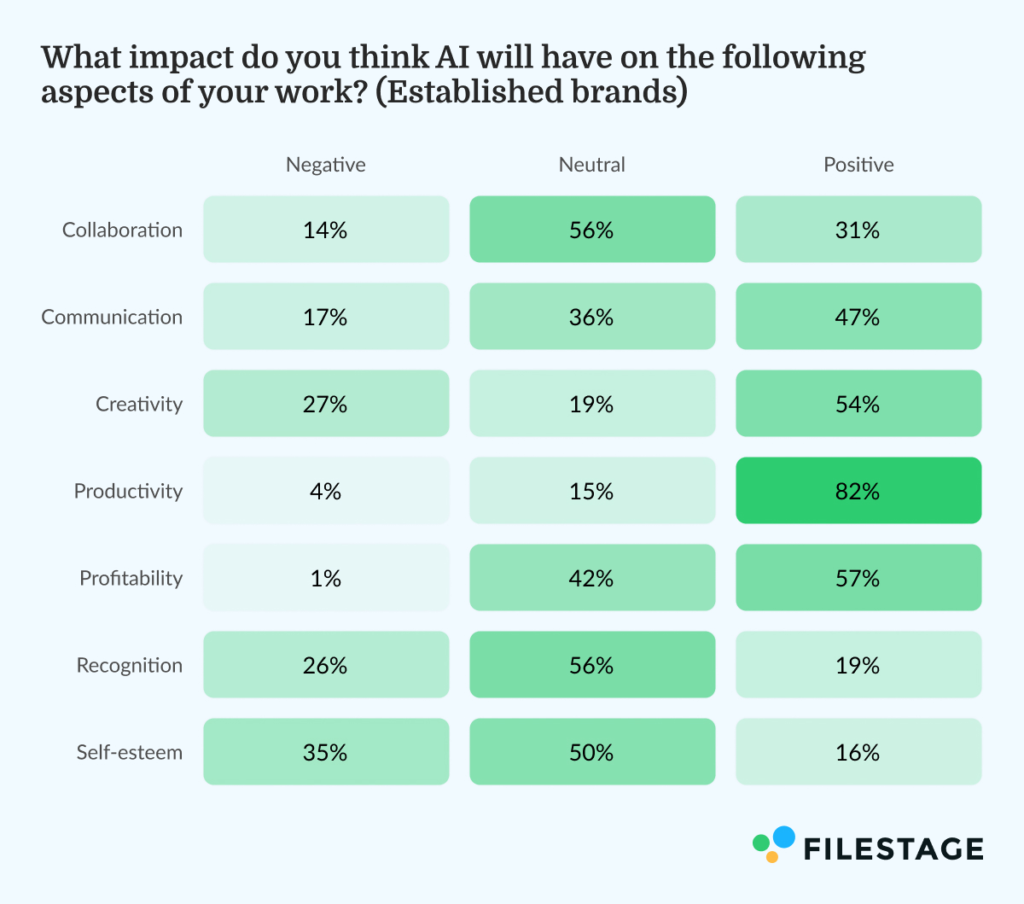
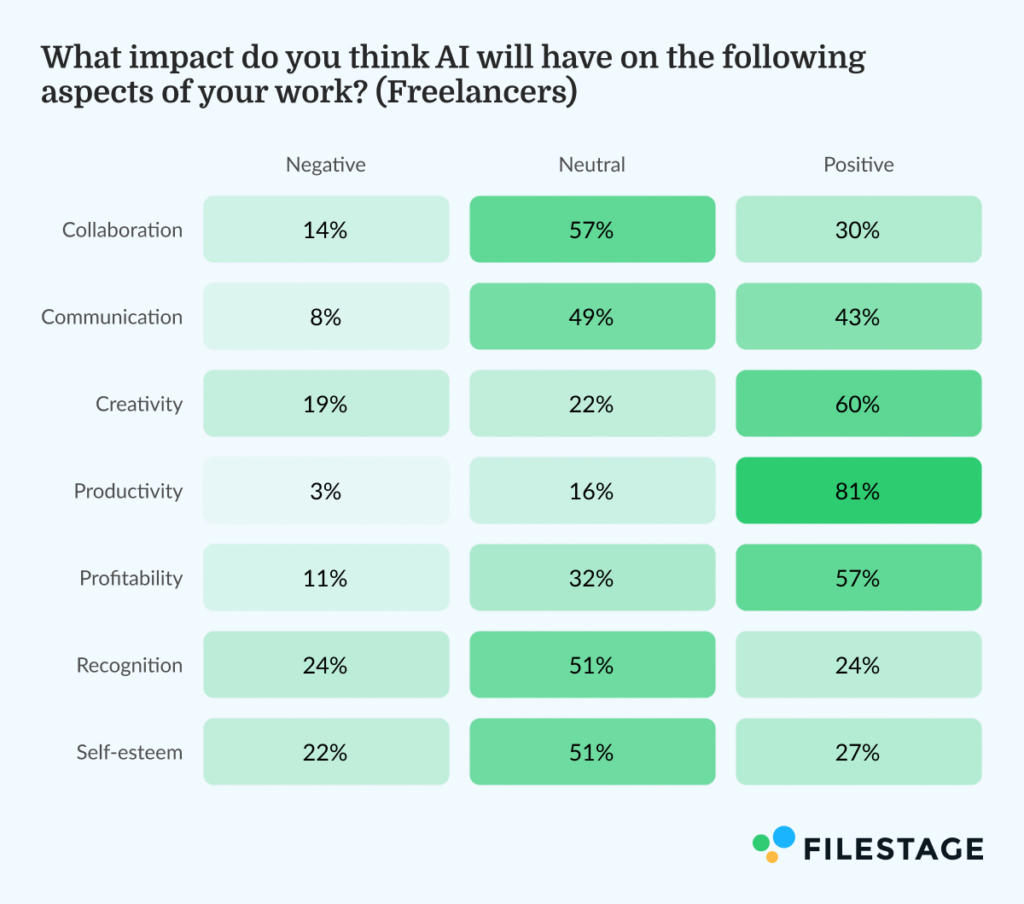
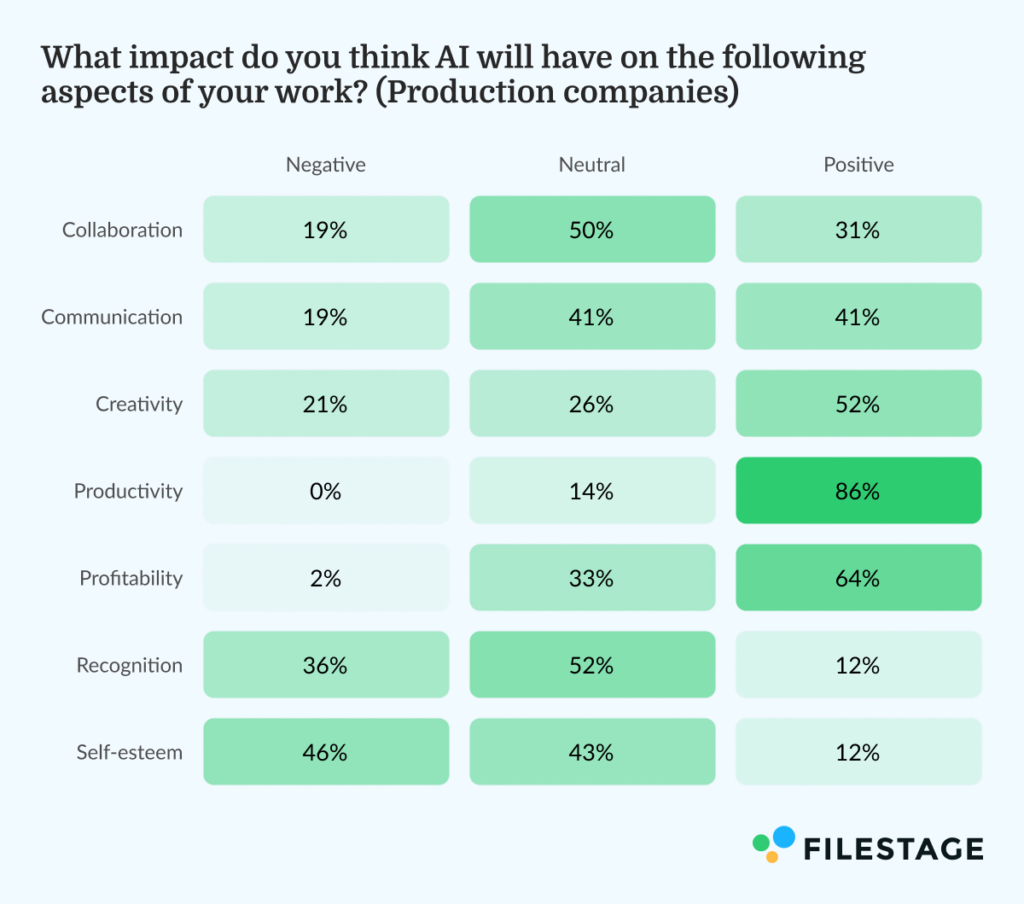
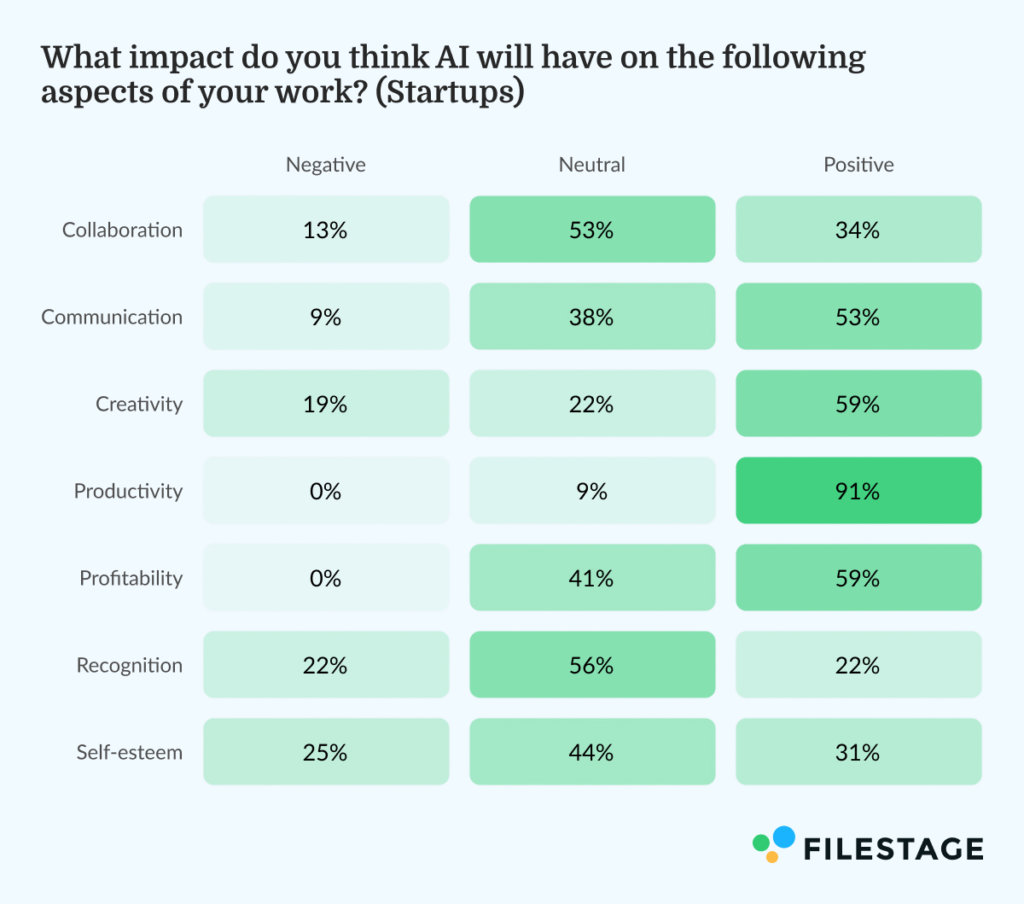
1-in-2 think AI will become a key part of their role, and 63% say it will become part of university marketing degrees
When asked about the likelihood of a range of scenarios, 1-in-2 people said that AI is likely to become a key part of their role. Startups were by far the most enthusiastic on this point, with 72% saying it was likely.
“AI is here to stay,” said freelance writer, Helmut Wagabi. “We simply need to learn and make good use of it. Apply AI correctly, but countercheck everything generated by it. It is not always accurate.”
Speaking of accuracy, 62% say AI is likely to increase the importance of content reviews – with startups (75%) again coming out highest. In fact, across the board, this scenario had the fewest number of “Unlikely” responses. This suggests a strong consensus for the importance of a reliable marketing approval process, both now and in the future.
Universities will play a huge role in shaping that future. And our study found that 63% think AI will become a key part of university marketing degrees. From perfecting prompts to understanding the risks and limitations of AI, exactly what this will look like is anyone’s guess.

In the words of the marketing Guru, Philip Kotler, ‘Marketing takes a day to learn. Unfortunately, it takes a lifetime to master.’ With AI, this journey will definitely be much faster and more productive!
Shakti Shrivastava, Acquisition Marketing Lead at LinkedIn
“Many creative professionals are concerned that AI will lower the barrier for entry into the field, thus putting skilled jobs at risk of being stolen by amateurs,” says Tanner Beckerman, Graphic Designer at Mixed Media Creations.
“While it’s true that AI tools will make creative processes more accessible to the general population, they also enable skilled professionals to go further and faster than ever before. It’s a simple matter of supply and demand – the most hireable candidates are the ones that are able to take these tools and elevate them beyond plug-and-play levels. Thus it is in the best interest of universities to invest in teaching these skills.”
As Shakti Shrivastava, Acquisition Marketing Lead at LinkedIn put it, “In the words of the marketing Guru, Philip Kotler, ‘Marketing takes a day to learn. Unfortunately, it takes a lifetime to master.’ With AI, this journey will definitely be much faster and more productive!”
Overall
Agencies
Brands
Freelancers
Production companies
Startups
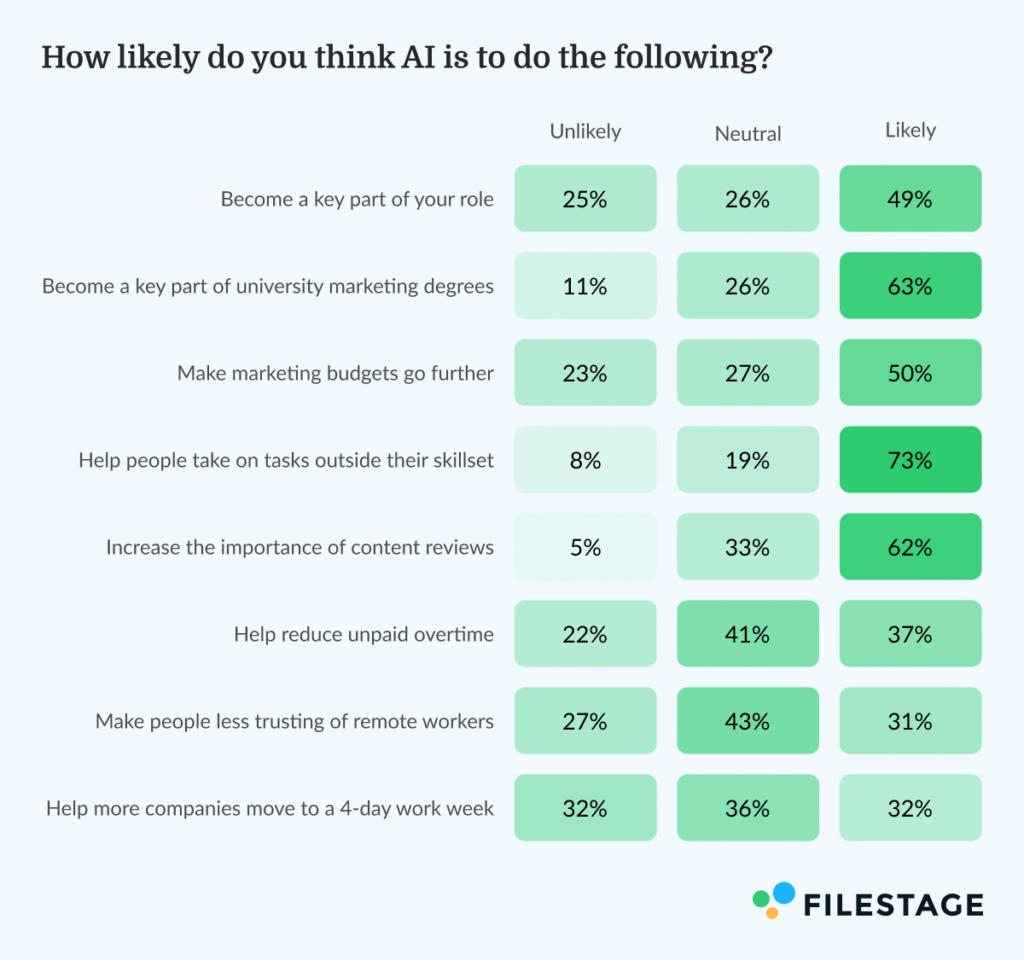
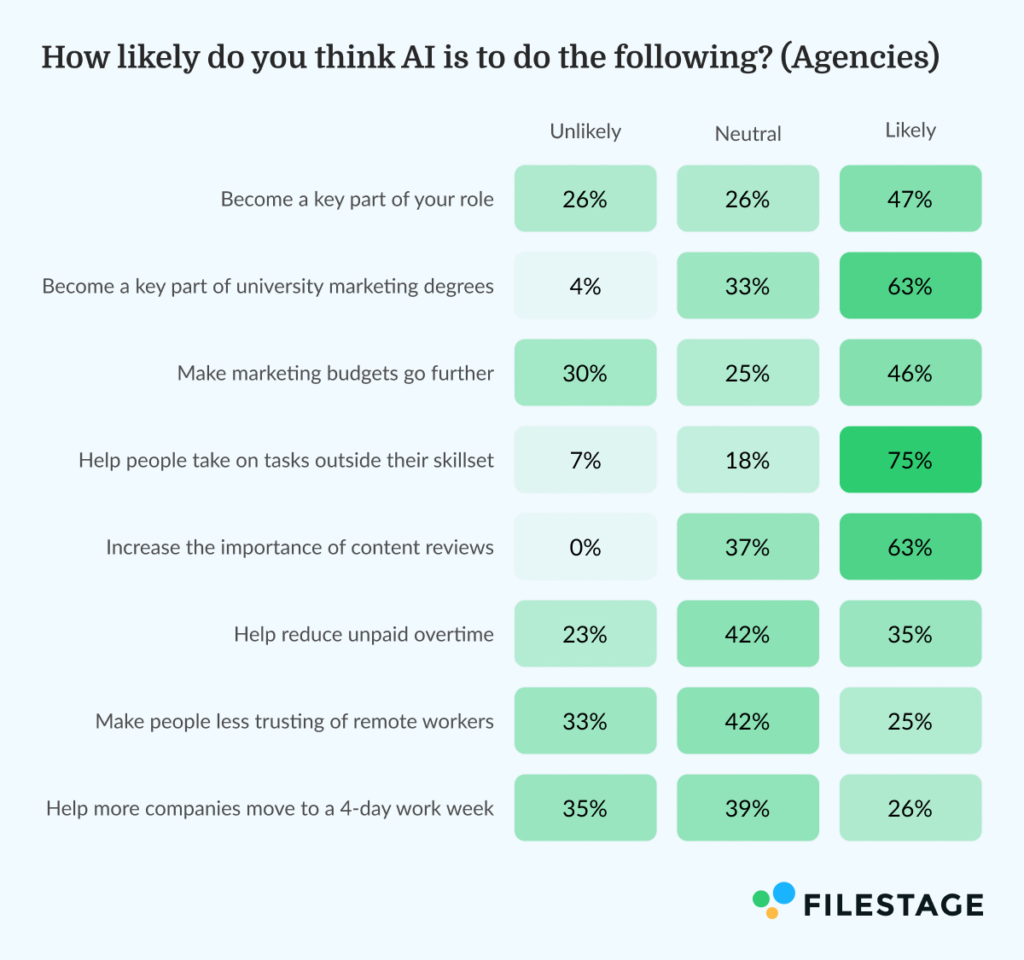
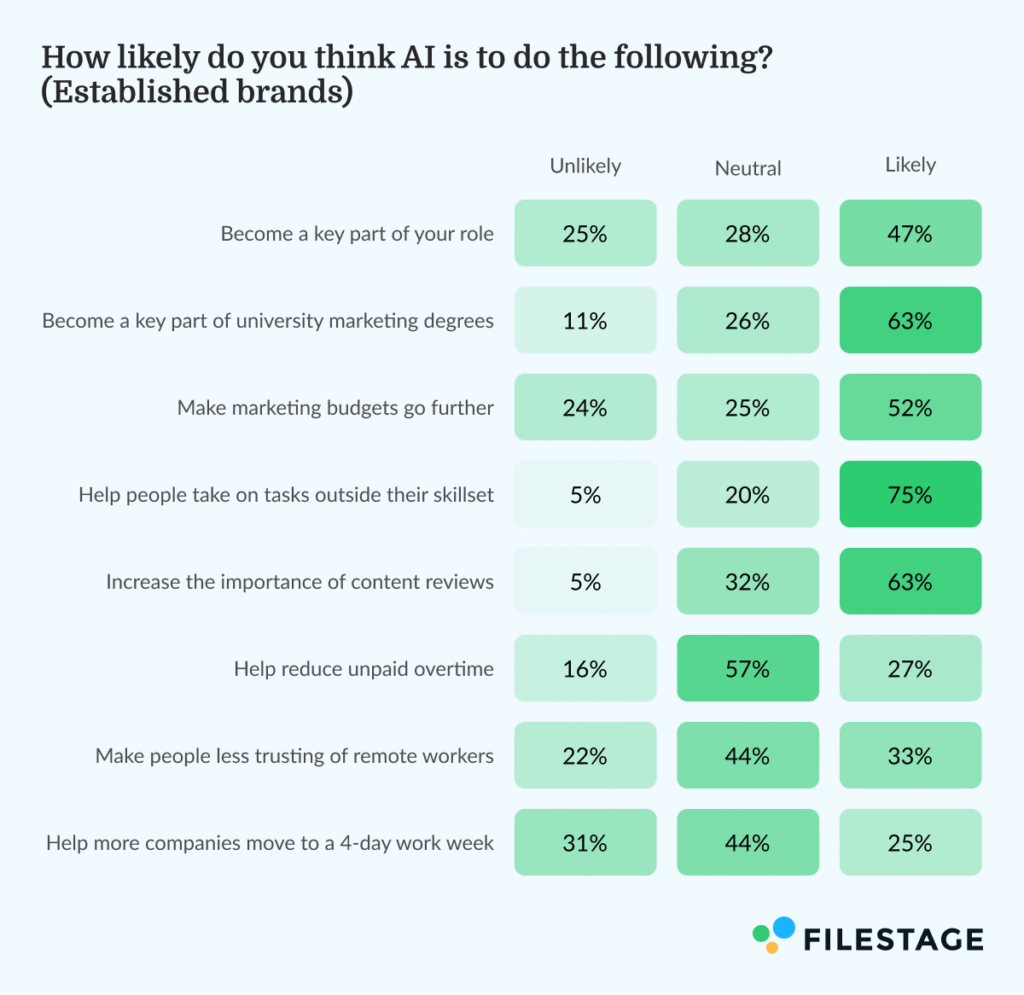
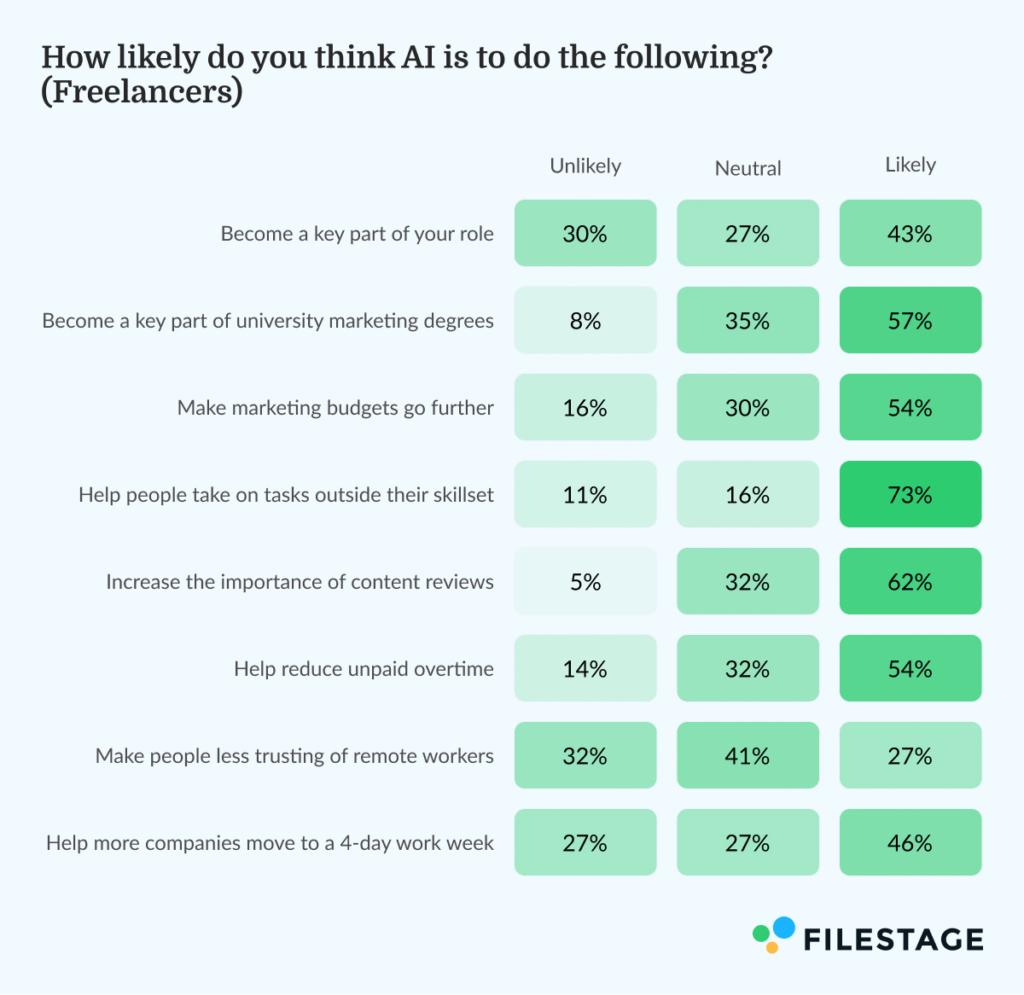

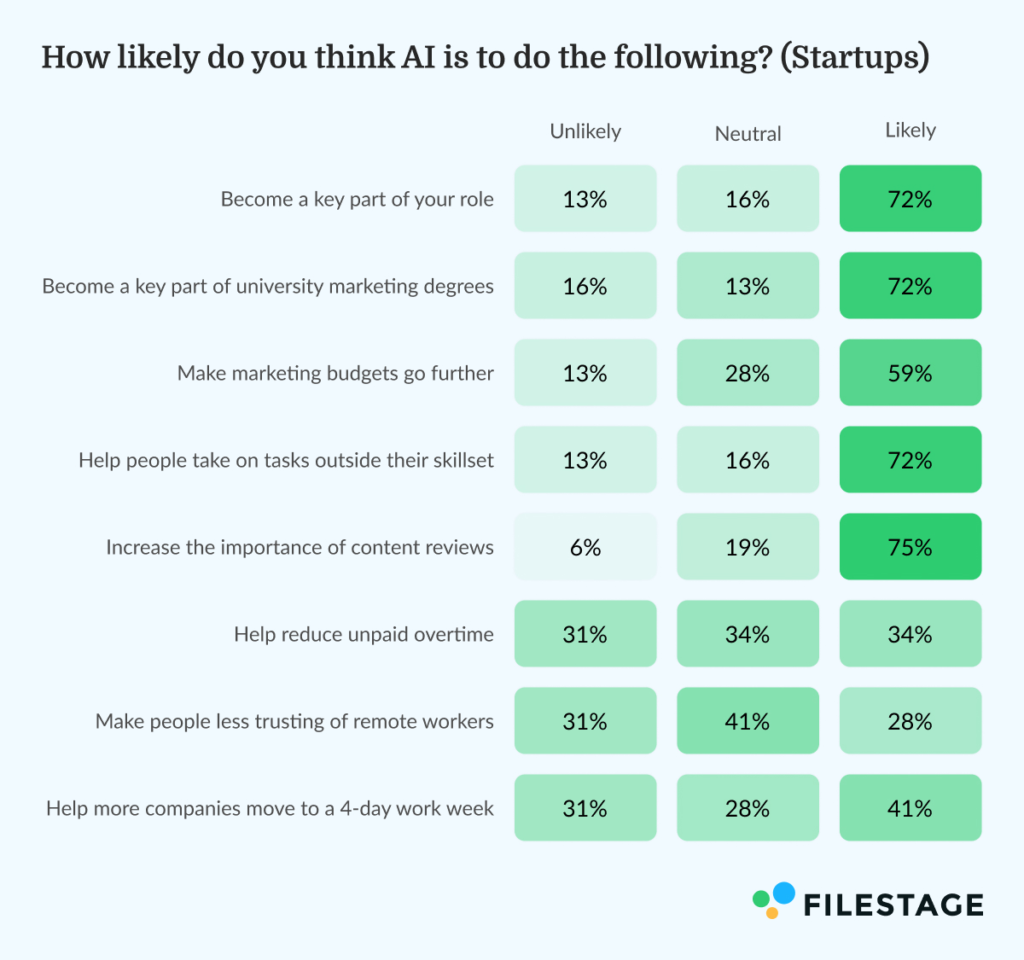
37% think AI will help reduce unpaid overtime, and 1-in-3 say it could help more companies move to a 4-day week
We all know AI can boost productivity. But, the big question is, who benefits from those time savings?
Our study found that 37% think AI will reduce unpaid overtime. This suggests that at least some people feel those productivity wins will filter through to employees.
But where people get a bit more polarized is on the topic of a 4-day work week, with 32% saying it’s likely and an equal 32% saying it’s unlikely.
“I’d like to think it will ease moving to a 4-day work-week,” said one respondent. Others were less optimistic, with one saying, “I feel like it won’t. Headcount would more likely be reduced with responsibility shifted to fewer people who, relying increasingly on generative AI, would tend to overlook the mistakes it could cause.”

AI can definitely help boost productivity and remove manual tasks, so if the company has the right mind set with regards to reducing the working week, it will be able to help them.
Robbie Blue, Head of People at Filestage
Robbie Blue, Head of People at Filestage, says, “It’s no surprise that people are divided on whether AI will be able to reshape the way we work. I think if both the management and employees in a company are fully onboard with a four-day week, they will find ways to make it work by ensuring those four days are more productive.
“AI can definitely help boost productivity and remove manual tasks, so if the company has the right mind set with regards to reducing the working week, it will be able to help them.”
When asked how they would spend their one extra day off per week, socializing with family and friends (62%), sports and exercise (43%), and relaxation (38%) were the top responses. Only 8% said they would use that time for other work.
One respondent summed it up perfectly: “I would rest and spend a ton of time reading, painting, being in nature, so that I could get back to work refreshed, re-envisioned, and ready to tackle work from new perspectives.”
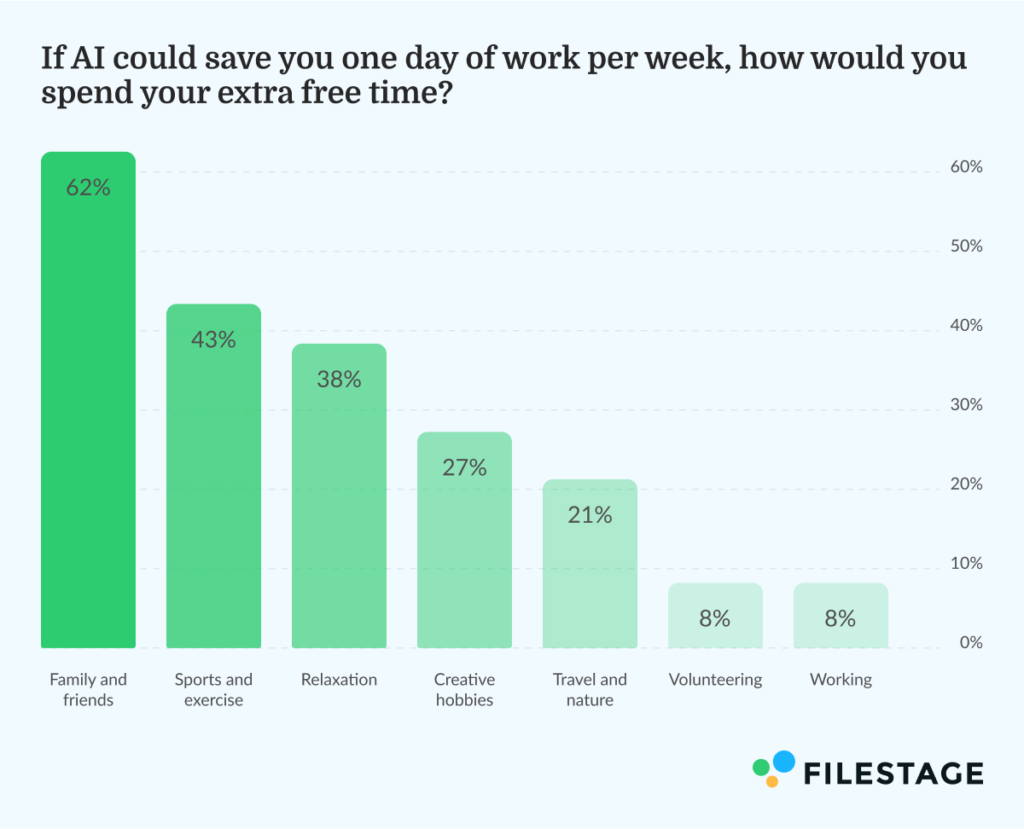
Over 50% think parts of SEO, writing, and content marketing will be replaced in the next 5-10 years
There’s been a lot of scaremongering about AI replacing people over the last year. But the general consensus among experts is that AI won’t replace humans. Instead, humans with AI will replace humans without it.
To put that to the test, we quizzed people about a range of specialisms, asking how likely they were to be all or partially replaced in the next 5-10 years.
Here are the three most likely to be replaced:
- SEO – 65%
- Writing – 58%
- Content marketing – 58%
Now, of course, this could be something small like using AI to speed up research or create article outlines. Or, it could go as far as getting AI to write an entire piece of content.
On the topic of SEO specialists being replaced, Patricia Cosma, Marketing Specialist at X2 Mobile, says, “The increasing power of AI is making it possible for machines to automate many of the tasks that are currently performed by SEO specialists (such as keyword research or content optimization), as we can already see in some SEO tools already.

The increasing power of AI is making it possible for machines to automate many of the tasks that are currently performed by SEO specialists (such as keyword research or content optimization).
Patricia Cosma, Marketing Specialist at X2 Mobile
“On top of that, the way people search is changing. Until now, users were more likely to search generic keywords to find information. However, in recent years, people have been using more specific and semantically related keywords, plus longer search queries.
“The emergence of voice search, AI-powered search, and other technologies is changing the way users interact with search engines, making it challenging for traditional SEO methods to adapt. As a result, I believe that the role of SEO specialists will be partially replaced in the next 5-10 years. There will still be a need for human SEO specialists who can understand the nuances of search engine algorithms and who can develop and execute effective strategies.
“SEO professionals will need to be more strategic and creative in their approach, placing greater emphasis on factors like content quality, mobile responsiveness, and overall user satisfaction, while leveraging AI to automate many of their tasks.”
And if you’re considering a career change, here are the three specialisms people think are most unlikely to be replaced are:
- Branding – 37%
- Project management – 36%
- PR – 34%
Here’s what Marcel Semper, Product Marketing Manager at Item Industrietechnik GmbH, has to say about branding. “Branding is about creativity and emotion. Its focus is on creating a connection between the company, consumers and potential applicants. It’s about crafting authentic and engaging stories and experiences that resonate with people. AI still can’t and will not be able to fully capture or replicate the nuances of human emotions in depth.
“To bring a company’s culture to paper it needs many different people of different parties to come together and speak. Only humans have the intuitive understanding of cultural differences and social dynamics, allowing them to respond accordingly. Especially global companies that tailor their branding to different cultures and markets. AI systems are limited in their ability to grasp such complex factors.
“Strategies are based on human experiences, insights, and predictions. AI may be good at analyzing patterns, but it lacks the ability to work out strategies that combine business know-how, visions, ethical considerations, and human values together.”
Overall
Agencies
Brands
Freelancers
Production companies
Startups
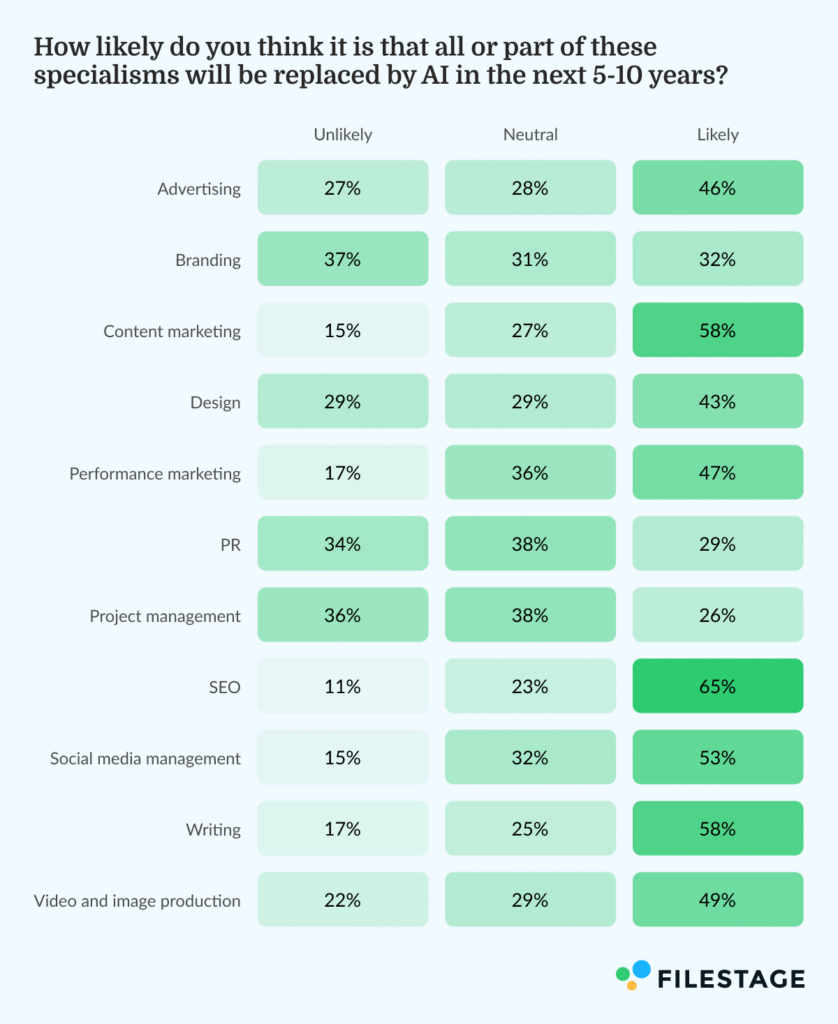
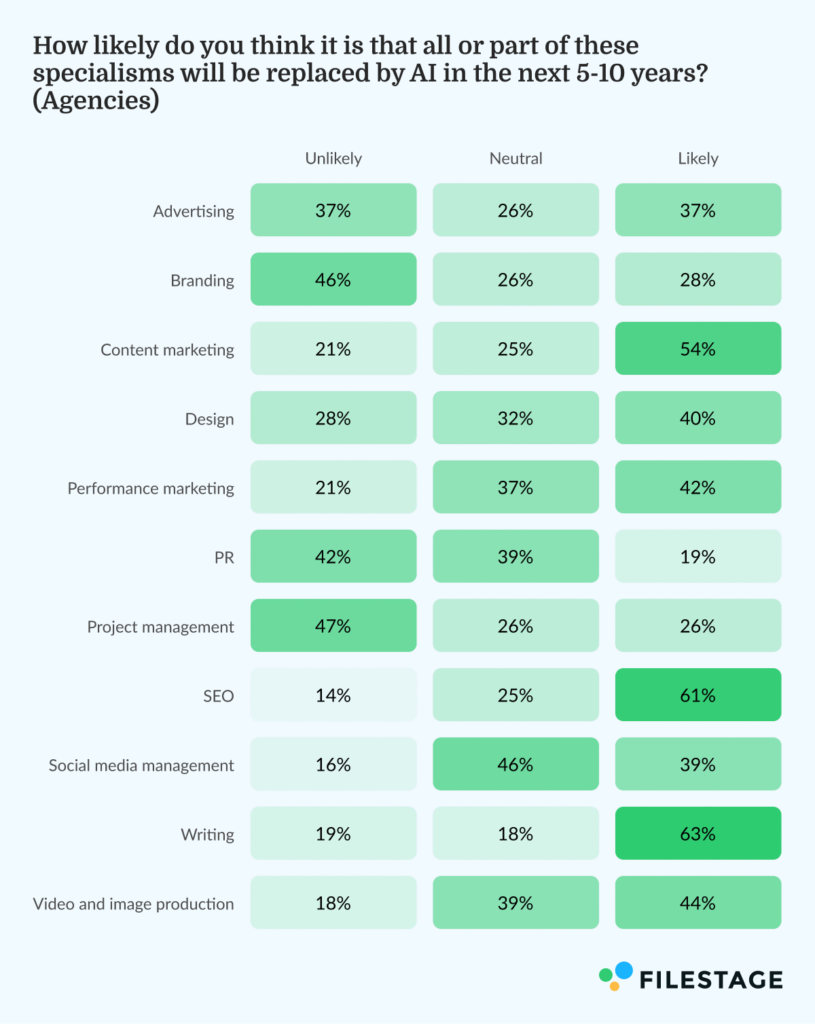
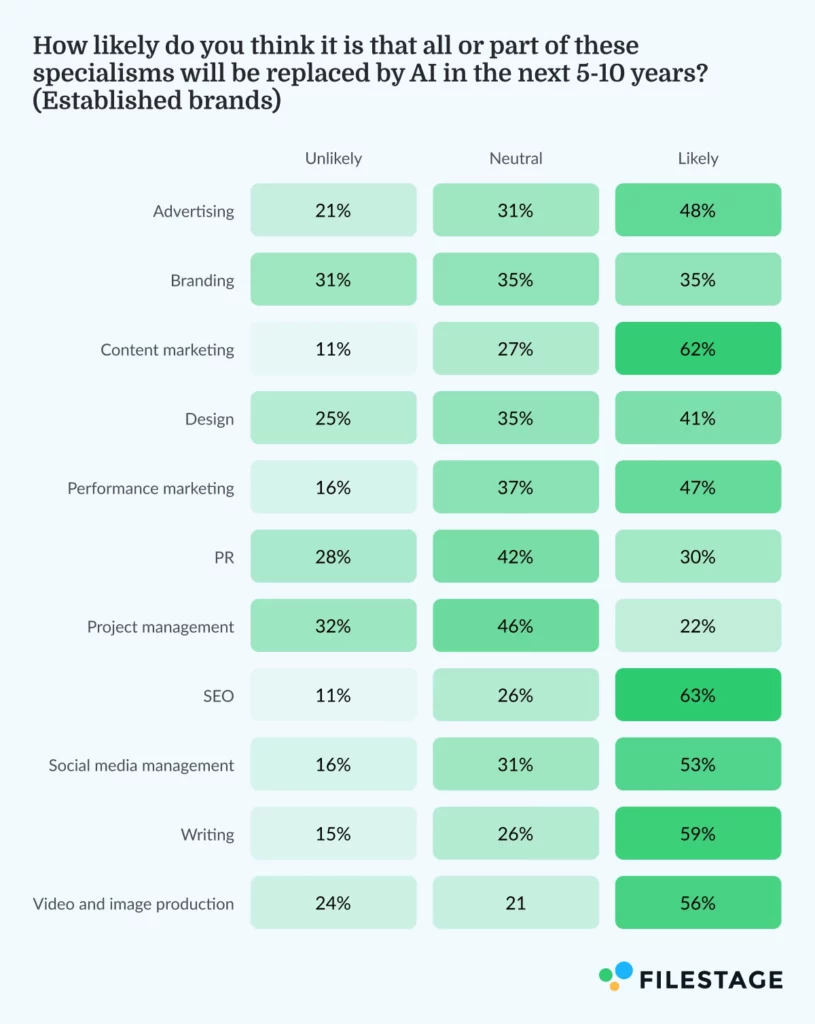
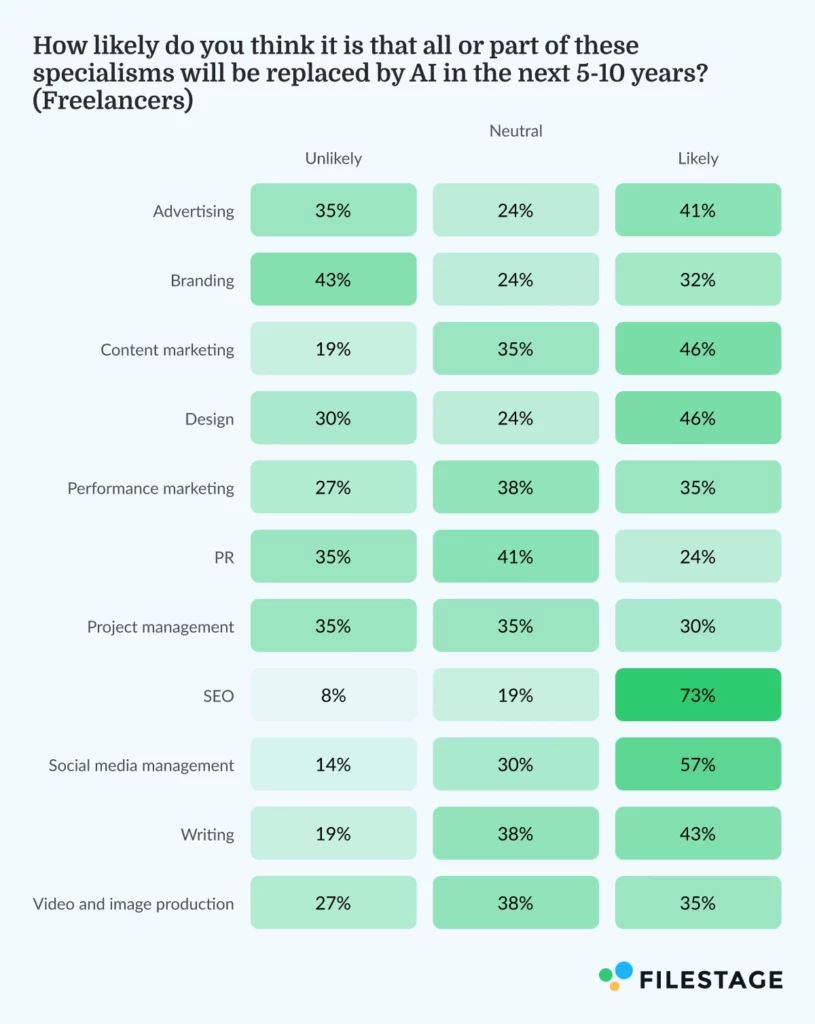
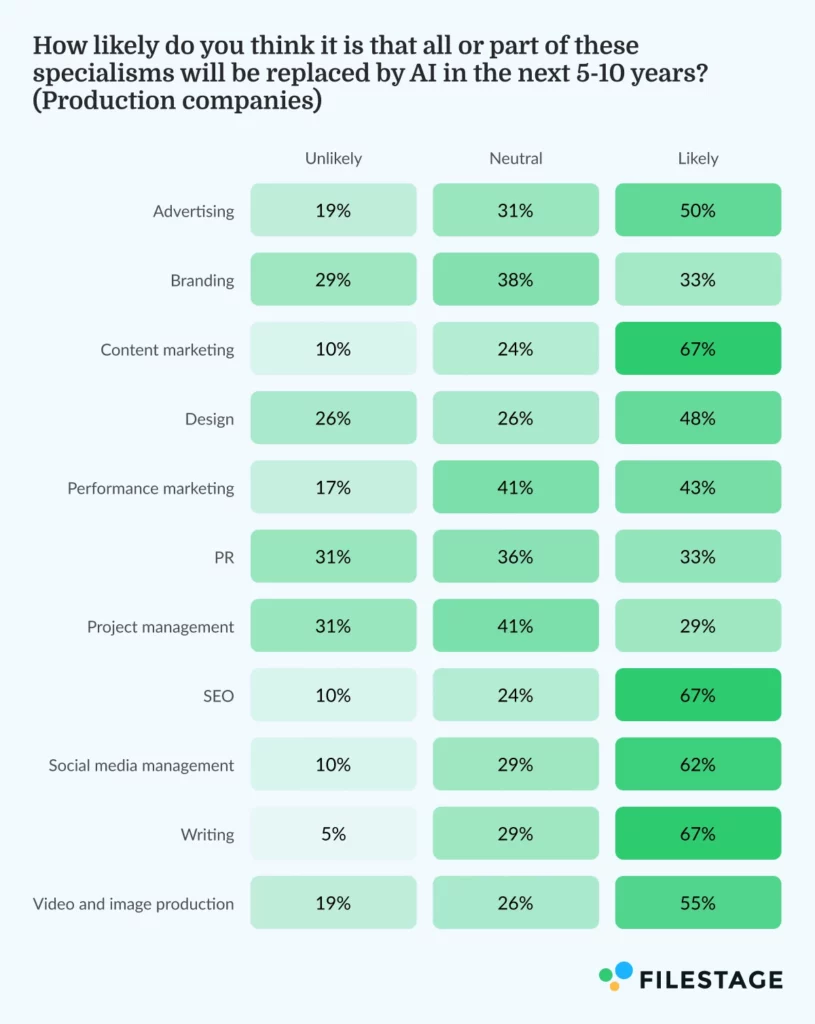
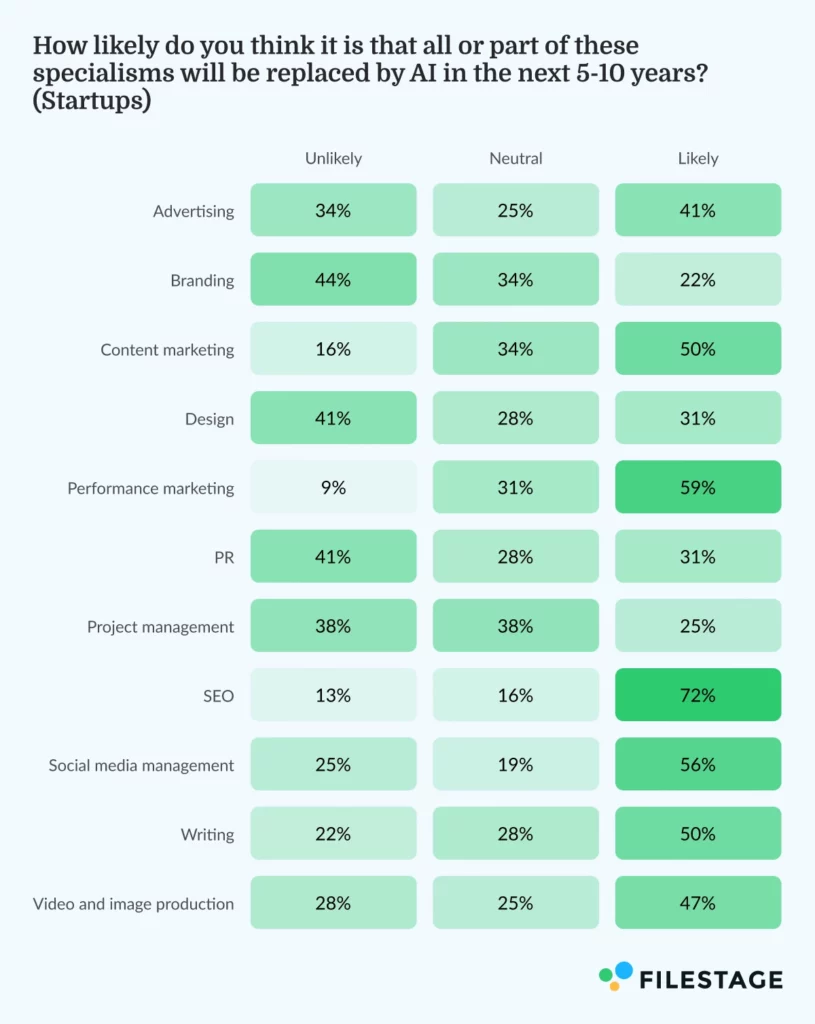
Methodology
The survey behind this report was conducted in December 2023, and the report was published at the end of December. We received 266 responses from a wide range of advertising and marketing professionals, covering brands, agencies, production companies, freelancers, and startups.

